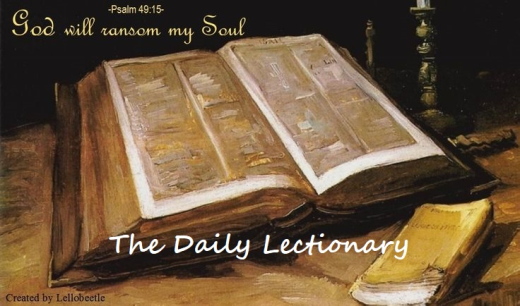The Daily Lectionary
MONDAY, October 7, 2019
(Revised Common Lectionary Year C)
(Semi-continuous Reading Plan)
Psalm 137
Lament over the Destruction of Jerusalem
1 By the rivers of Babylon—
there we sat down and there we wept
when we remembered Zion.
2 On the willows there
we hung up our harps.
3 For there our captors
asked us for songs,
and our tormentors asked for mirth, saying,
“Sing us one of the songs of Zion!”
4 How could we sing the Lord’s song
in a foreign land?
5 If I forget you, O Jerusalem,
let my right hand wither!
6 Let my tongue cling to the roof of my mouth,
if I do not remember you,
if I do not set Jerusalem
above my highest joy.
7 Remember, O Lord, against the Edomites
the day of Jerusalem’s fall,
how they said, “Tear it down! Tear it down!
Down to its foundations!”
8 O daughter Babylon, you devastator!
Happy shall they be who pay you back
what you have done to us!
9 Happy shall they be who take your little ones
and dash them against the rock!
Lamentations 1:16-22
16 For these things I weep;
my eyes flow with tears;
for a comforter is far from me,
one to revive my courage;
my children are desolate,
for the enemy has prevailed.
17 Zion stretches out her hands,
but there is no one to comfort her;
the Lord has commanded against Jacob
that his neighbors should become his foes;
Jerusalem has become
a filthy thing among them.
18 The Lord is in the right,
for I have rebelled against his word;
but hear, all you peoples,
and behold my suffering;
my young women and young men
have gone into captivity.
19 I called to my lovers
but they deceived me;
my priests and elders
perished in the city
while seeking food
to revive their strength.
20 See, O Lord, how distressed I am;
my stomach churns,
my heart is wrung within me,
because I have been very rebellious.
In the street the sword bereaves;
in the house it is like death.
21 They heard how I was groaning,
with no one to comfort me.
All my enemies heard of my trouble;
they are glad that you have done it.
Bring on the day you have announced,
and let them be as I am.
22 Let all their evil doing come before you;
and deal with them
as you have dealt with me
because of all my transgressions;
for my groans are many
and my heart is faint.
James 1:2-11
Faith and Wisdom
1:2 My brothers and sisters, whenever you face trials of any kind, consider it nothing but joy, 3 because you know that the testing of your faith produces endurance; 4 and let endurance have its full effect, so that you may be mature and complete, lacking in nothing.
5 If any of you is lacking in wisdom, ask God, who gives to all generously and ungrudgingly, and it will be given you. 6 But ask in faith, never doubting, for the one who doubts is like a wave of the sea, driven and tossed by the wind; 7, 8 for the doubter, being double-minded and unstable in every way, must not expect to receive anything from the Lord.
Poverty and Riches
9 Let the believer who is lowly boast in being raised up, 10 and the rich in being brought low, because the rich will disappear like a flower in the field. 11 For the sun rises with its scorching heat and withers the field; its flower falls, and its beauty perishes. It is the same way with the rich; in the midst of a busy life, they will wither away.
Optional parts of the readings are set off in [square brackets.]
The Bible texts of the Old Testament, Epistle and Gospel lessons are from the New Revised Standard Version Bible, copyright 1989 by the Division of Christian Education of the National Council of the Church of Christ in the USA, and used by permission.
The Daily Lectionary is a three year cyclical lectionary. We are currently in Year C. Beginning with the first Sunday of Advent in 2019, we will be in Year A. The year which ended at Advent 2018 was Year B. These readings complement the Sunday and festival readings: Thursday through Saturday readings help prepare the reader for the Sunday ahead; Monday through Wednesday readings help the reader reflect and digest on what they heard in worship. Revised Common Lectionary Daily Readings, copyright © 2005 Consultation on Common Texts. www.commontexts.org
The Daily Lectionary
Psalm 137; Lamentations 1:16-22; James 1:2-11









